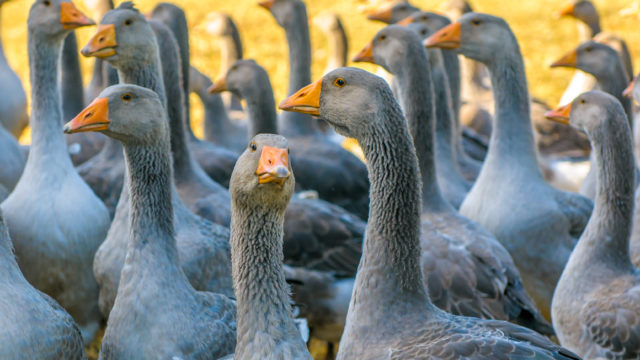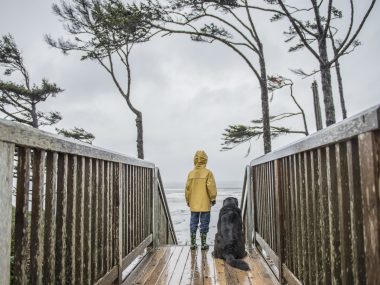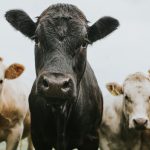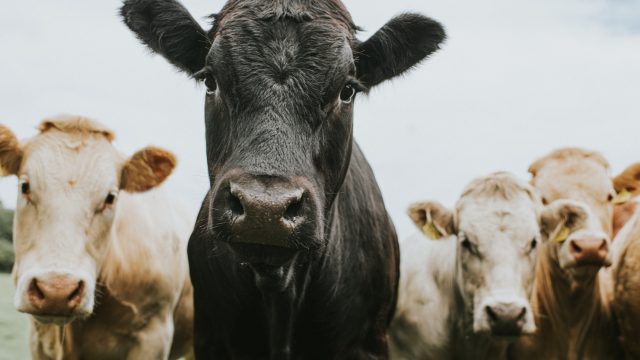
Foie Gras
Foie gras is French for “fat liver.”


Foie gras is a cruelly-produced, high-priced “gourmet” delicacy that comes from force-feeding young ducks (or geese) until their livers swell to eight or more times their natural size. Foie gras (French for “fat liver”) is the diseased liver of an animal who has suffered enormously.
That’s why California’s 2004 ban (which went into effect in 2012) on the production and sale of foie gras was a momentous step forward. Unfortunately, the state ban has been subject to numerous legal challenges by the foie gras industry. However, courts have repeatedly rejected their arguments and upheld the constitutionality of the law. In January 2019, the U.S. Supreme Court, for the second time, denied the industry’s plea to take its case, and a lower court reaffirmed its constitutionality again a year later.
The Inhumane Choice
A day in the life of a bird raised for foie gras includes several force-feedings in which a thick pipe is rammed down his throat and huge amounts of grain pumped directly into his stomach. Free time is spent crammed in extremely small, dirty pens. Infection and painful punctures in the beak and throat are common, and many ducks cannot move normally and become too heavy for their legs to hold them. When ducks get sick from these conditions, human workers may simply throw them into a trash heap. The ducks who survive are eviscerated and their diseased livers sold as food by producers such as New York’s Hudson Valley Foie Gras (HVFG).
Previous investigations into Hudson Valley Foie Gras revealed appalling conditions. Dead ducks tossed into garbage cans or lying alongside living ducks struggling to breathe, unable to escape, with untreated sores left festering. Hudson Valley Foie Gras, the largest U.S. producer of foie gras, once tried to define itself as “The Humane Choice” in its promotional materials while brutalizing ducks for gourmet profits.
That’s why in 2012, the Animal Legal Defense Fund filed a landmark lawsuit against Hudson Valley Foie Gras—it was the first time a humane competitor used false advertising laws in a federal case alongside an animal protection group.
Ella Nemcova, a co-plaintiff in the Animal Legal Defense Fund’s suit, owns a Brooklyn-based company called The Regal Vegan, which produces a legitimately humane and plant-derived foie gras alternative called “Faux Gras.” HVFG’s false advertising violated state and federal laws by unfairly urging consumers to buy force-fed foie gras rather than cruelty-free products like The Regal Vegan’s. the Animal Legal Defense Fund dismissed that lawsuit after Hudson Valley Foie Gras removed its deceptive “humane” language.
Constitutional Challenges to the Ban
Unfortunately, the law breaking didn’t stop there. Some restaurants in California (and the producers who supplied them) didn’t want to lose the bankroll they made from animal cruelty, and protested the state ban enormously. Several wantonly violated the humane values put forth by the voters of California. They colored themselves as anti-ban heroes, despite engaging in inhumane and illegal activity. However, the courts did not agree with that portrayal of their illegal activities.
For example, in July 2013, the Animal Legal Defense Fund won a legal battle against Napa, California-based La Toque restaurant for illegally selling force-fed foie gras products. La Toque appealed the Animal Legal Defense Fund’s victory by claiming that breaking the law to sell cruel products was “freedom of speech.” The California Court of Appeal scoffed and agreed with the Animal Legal Defense Fund that so-called “gifts” of foie gras to paying customers were illegal foie gras sales, and that such conduct is not First Amendment-protected expressive activity under the U.S. Constitution.
In August 2013, the Animal Legal Defense Fund achieved one more victory when the Ninth Circuit Court of Appeals upheld an earlier decision denying a temporarily lifting of the ban. The Animal Legal Defense Fund, along with Farm Sanctuary, HSUS, Humane Society Veterinary Medical Association, and the Marin Humane Society, filed an amicus brief in the case.
On January 27, 2014 the Ninth Circuit denied a request by a coalition of foie gras producers to rehear their constitutional challenge against California’s ban, and on October 14, 2014, the Supreme Court declined to review the case, allowing the ban to stand. A January 2015 decision barred enforcement of the sales ban, but the Ninth Circuit reversed that decision and, exactly four years later, in January 2019, the Supreme Court again denied the foie gras industry’s petition to overturn the ban.
A Diseased Food Product
On November 25, 2019, New York City (NYC) stepped up to protect ducks by banning the sale of foie gras. Set to take effect in 2022, the ban would prohibit the products of force-feeding from being sold and served in city restaurants—about 1,000 of which were serving the cruel delicacy when the ban was passed. The Animal Legal Defense Fund was proud to be part of the coalition of organizations that made the passage of this landmark ordinance possible.
However, in September 2022, just before the ban was to go into effect, the foie gras industry secured a State Supreme Court injunction against the NYC ban, and the New York State Department of Agriculture and Markets has now referred to the incoming ban as “unreasonably restrictive” and in violation of state agricultural law.
NYC responded to the injunction with a lawsuit against the Agricultural Department, saying the agency had overreached, calling the judgement “arbitrary and capricious.” The city also argued the farms are exaggerating the financial impact of the ban on their livelihoods because it only prohibits the sale in NYC, and they produce products other than foie gras.
The status of the NYC ordinance remains in limbo; however, we hope the city will prevail in the quest to protect ducks from the cruelty of foie gras.
Taking on a Public Health Threat and Animal Cruelty Nightmare
Foie gras has been banned in over a dozen countries. Force-feeding damages the livers of the birds so badly it induces an extremely painful disease known as hepatic lipidosis. Scientific studies also show that consumption of foie gras is associated with a fatal disease in humans called secondary amyloidosis. Hundreds of thousands (and possibly millions) of birds have been slaughtered and their diseased organs sold into the human food supply for the financial profit of foie gras producers.


Foie gras is produced by force-feeding young birds until their livers swell to eight or more times their natural size.
Timeline
View:
-
November 25, 2020
The Animal Legal Defense Fund, in coalition, files an amicus brief in the foie gras industry’s continuing challenge to California’s foie gras sales ban. The foie gras industry is appealing the court’s denial of their motion for reconsideration of the dismissal of their constitutional claims. Additionally, California is appealing the court’s determination that the law does not apply to supposedly “out-of-state” sales to California purchasers.
-
July 14, 2020
The industry’s 2019 attempt to resuscitate its failed constitutional challenge to California’s foie gras sales ban falls flat again. The U.S. District Court for the Central District of California refuses to reconsider a January 2020 decision reaffirming that the state law is constitutional and enforceable. The judge declares that the law does not prohibit imports of foie gras from out of state, but further warns foie gras industry plaintiffs that similar constitutional claims in the future would result in court-ordered sanctions.
-
November 25, 2019
New York City bans the sale of foie gras! Signed into law by Mayor de Blasio on November 25th, 2019, the ban goes into effect in 2022. The Animal Legal Defense Fund was proud to be part of the coalition of organizations that made the passage of this landmark legislation possible.
-
March 11, 2019
The foie gras industry plaintiffs continue their challenge to the constitutionality of California’s ban on the sale of foie gras again – amending their complaint for a third time. The Ninth Circuit has twice upheld the California’s law’s constitutionality, finding that it is not preempted by federal law and does not violate the dormant Commerce Clause. The U.S. Supreme Court has refused the industry’s requests for review of both decisions.
-
January 21, 2019
The Animal Legal Defense Fund launches the foie gras restaurant tracker form for people to report illegal foie gras sales in California.
-
January 15, 2019
With the ban on foie gras again in effect in California, the Animal Legal Defense Fund resumes its case against Napa restaurant, La Toque, for serving foie gras.
-
January 7, 2019
Victory! The Supreme Court denies the foie gras industry’s petition attacking California’s ban on the sale of foie gras. As a result, the Ninth Circuit Court of Appeals’ mandate goes into immediate effect. It is now against the law to sell foie gras in California. The Animal Legal Defense Fund filed numerous amicus briefs in the six-plus years of litigation, urging courts to uphold the law.
-
September 15, 2017
The Ninth Circuit Court of Appeals rules in favor of California’s milestone law banning the sale of foie gras in a unanimous decision reaffirming the law’s constitutionality. The Animal Legal Defense Fund filed an amicus brief urging the court to support the law. Unfortunately, the ban won’t go into effect immediately due to continued appeals from the foie gras industry. The Animal Legal Defense Fund is committed to continuing to fight against legal attacks on this landmark law.
-
December 31, 2016
Oral arguments are heard in California’s appeal of the Jan. 7 District Court ruling that overturned the state ban on foie gras.
-
December 14, 2016
A federal judge grants summary judgment to the USDA in lawsuit brought by the Animal Legal Defense Fund and a coalition to compel the agency to declare foie gras a diseased product. However, the court ruled the Animal Legal Defense Fund did have standing to bring its suits against the USDA.
-
August 31, 2016
Animal Legal Defense Fund submits amicus brief in support of California’s appeal of the Jan. 7 District Court ruling that overturned the state ban on foie gras.
-
August 15, 2016
The Animal Legal Defense Fund gives oral arguments in the U.S. District Court for the Central District of California in lawsuit against the USDA for allowing diseased poultry products into the food supply.
-
November 5, 2015
Animal Legal Defense Fund sues the USDA for the Department’s “undue delay” in responding to Animal Legal Defense Fund’s 2011 petition to require that foie gras bear a warning label stating, “NOTICE: Foie gras products are derived from diseased birds.”
-
June 11, 2015
The Supreme Court of California denies Napa restaurant La Toque’s petition for review, letting stand the appellate court’s decision in ALDF’s favor.
-
March 5, 2015
The California Court of Appeal for the First Appellate District rejected the Napa restaurant La Toque’s attempt to circumvent the state ban on selling foie gras.
-
February 4, 2015
California Attorney General Kamala Harris appealed the Jan.7 District Court ruling that overturned the state ban on foie gras; Animal Legal Defense Fund expects the ban will be reinstated.
-
January 7, 2015
Animal Legal Defense Fund urges appeal after district court invalidates California ban on foie gras.
-
October 14, 2014
The U.S. Supreme Court declines to disturb California ban on foie gras.
-
August 20, 2013
The Ninth Circuit Court of Appeals upholds California ban on foie gras.
-
June 25, 2013
The District court grants the Animal Legal Defense Fund groundbreaking legal standing to bring a “humane” false advertising lawsuit as an advocacy organization, in this case against Hudson Valley Foie Gras.
-
April 12, 2013
Landmark victory for Animal Legal Defense Fund in lawsuit against Hudson Valley Foie Gras, which agrees to remove deceptive use of “humane” descriptions from its promotional materials.
-
March 14, 2013
The Animal Legal Defense Fund sues Napa, California-based La Toque restaurant for serving force-fed foie gras in violation of the state ban.
-
November 13, 2012
The Animal Legal Defense Fund files false advertising lawsuit against Hudson Valley Foie Gras, the largest producer of foie gras in the nation, for unfairly calling itself “the Humane Choice.”
-
September 25, 2012
Animal Legal Defense Fund files lawsuit against New York’s Department of Agriculture and Markets for allowing the sale of diseased poultry products, known as foie gras.
-
May 9, 2012
Animal Legal Defense Fund and coalition sue the U.S. Department of Agriculture (USDA) for violating Poultry Products Inspection Act by allowing the sale of adulterated poultry, known as foie gras.
Report Illegal Foie Gras Sales in California
After a long legal battle, California’s foie gras ban is in full effect, and restaurants are now unambiguously barred from selling the cruelly-produced, high-priced foie gras. But we need your help identifying restaurants that are flouting the law.
Related News
-
Resources to Support Those Affected by Recent Hurricanes
The Animal Legal Defense Fund is heartbroken watching the impact of the recent hurricanes unfolding on news and social media, and hearing reports from our staff, supporters, friends, and family in the impacted regions. No matter where you are located, these recent record-breaking storms remind all of us that disaster preparedness is critical.October 11, 2024 News -
FDA Should Require Labels for Animal-Derived Products, Petition Says
For religious, moral, food safety, and allergen concerns, consumers have a significant interest in the disclosure of animal-derived ingredientsOctober 2, 2024 News -
B.C. Supreme Court Awards Shared Custody of a Dog After Changes to Family Law Act
In a first-of-its-kind ruling in Canada, the Supreme Court of British Columbia (B.C.) has awarded shared custody of a dog, referencing her best interests, animal sentience, and recent changes to the Family Law Act, which differentiate companion animals from other property in divorce proceedings.October 2, 2024 Animal Law Update
Related Cases
-
La Toque Restaurant Illegally Selling Foie Gras
Animal Legal Defense Fund v. LT Napa Partners, LLC
-
Urging the FDA to Require Labels for Animal-Derived Products
Petition for Rulemaking to the FDA submitted on September 24, 2024
-
Challenging Tyson Foods Over Deceptive ‘Net-zero’ and ‘Climate-smart’ Beef Claims
Environmental Working Group v. Tyson Foods, Inc.
Looking for case and legal resources? View Resources
See More





